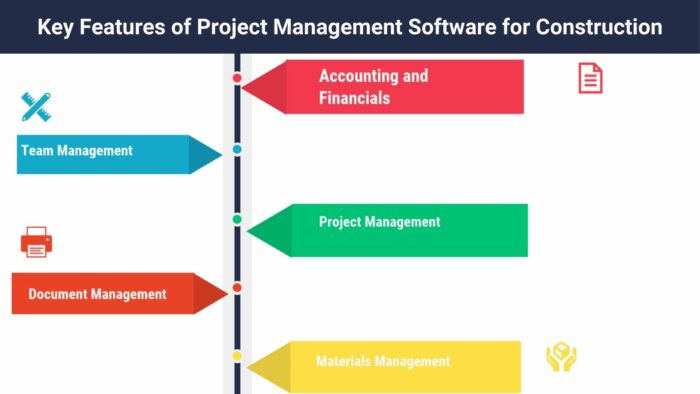Top 10 Best Construction Project Management Software Solutions
In the fast-paced world of construction, staying on top of projects can feel like a Herculean task. But what if I told you there’s a more efficient way to manage your construction projects? Enter the realm of project management software specifically designed for construction.
This game-changing technology is transforming how we plan, execute, and monitor construction projects. It’s not just about staying organized; it’s about maximizing efficiency, reducing costs, and delivering projects on time. So, let’s dive into the fascinating world of project management software in the construction industry, and discover how it could be your next secret weapon.
Learning Project Management in Construction

Learning project management in construction is essential for interpreting the technical nuances and complexities associated with the field.
The Unique Challenges of Construction Projects
Construction projects present several unique challenges. Factors such as weather variability, uncertain ground conditions, and intricate building regulations, among others, add layers of complexity. Unpredictability skews the schedules and affects the budget. For example, rough weather conditions could stall earthwork operations, while adverse ground conditions during excavation may halt the project, demanding a revised strategy. Consequently, the ability to foresee these complications, and design contingency plans is paramount for successful project completion.
The Role of Software in Streamlining Operations
Software solutions are assuming a fundamental role in alleviating these challenges and streamlining operations. Project management software, particularly designed for construction, offers specific functionalities to address industry-specific complexities. It allows for systematic monitoring of the project timeline, budget, and resources, contributing to improved planning and execution. For instance, software tools can help track material shipments, monitor labor hours, and streamline communication between different teams, all on a real-time basis. The benefits don’t stop there, with such software, potential issues get identified earlier, aiding in preemptive action and adjustments to keep the project on track. As such, adoption of project management software holds significant potential in transforming construction project delivery by enhancing efficiency and reducing costs.
Key Features of Project Management Software for Construction

To counter the multifaceted challenges inherent in construction projects, project management software emerges as a potent tool. Some distinct features cater specifically to the construction industry. The four primary ones include scheduling and time management tools, budgeting and cost control functionality, resource allocation, and inventory management, along with document control and compliance tracking.
Scheduling and Time Management Tools
Project management software for construction improves efficiency by facilitating precise scheduling and time management. It enables the structuring of a project timeline, allocating specific durations to tasks. For a snapshot, Asana offers a project timeline view where tasks get displayed against a timeline, visually encapsulating project progress. This feature aids in organizing tasks, incorporating potential delays, and offering a visual representation of deadlines, thus ensuring timely project completion.
Budgeting and Cost Control Functions
Keeping a strict check on finances is vital in any construction project. Budgeting and cost control functions embedded in project management software ensure that projects stay financially viable. Procore, a construction-oriented project management software, offers a cost management solution that provides real-time visibility into project financials. Given the inherent financial uncertainties associated with construction projects, these features significantly mitigate overspending risks. For efficient management, utilizing a Construction Budget is essential.
Resource Allocation and Inventory Management
Optimal utilization of resources is a key to successful construction project management. Construct Connect, another industry-specific project management software, has an intuitive dashboard for managing inventory effectively. It tracks material shipment in real time, preserving an accurate record of materials and minimizing waste. The tool equally aids in labor management by mapping labor hours precisely, ensuring effective resource allocation and minimal downtime.
Document Control and Compliance Tracking
Projects dealing with construction inherently carry massive compliance requirements and document controls. Compliance tracking enables strict adherence to stringent regulatory requirements and keeps projects legally sound. Project management software like Autodesk’s BIM 360 offers a document management solution that maintains a centralized database for all project documents, ensuring compliance with regulations and offering easy accessibility to all project stakeholders, thereby maintaining document control in a highly effective manner.
Top Project Management Software for Construction in 2024

Project management software plays a pivotal role in effective construction work. Notably, intuitive user interfaces, integration capabilities, and support resources are key aspects to consider when selecting software. Given such factors, here’s a comparative analysis of a few prominent software options for construction in 2024.
Comparing User Interface and Usability
Assessing user interface and usability affords me insight into the software’s ease of use. For instance, Procore’s interface combines simplicity and functionality, delivering high usability to users at all experience levels. Asana, on the other hand, demonstrates a more straightforward design, focusing on task management. However, Construct Connect offers a more robust interface, presenting data in a comprehensible format.
Integrations and Customization Options
Various construction project management softwares offer different integration and customization possibilities. Procore and Asana integrate effortlessly with common software applications like Google Drive and MS Suite, enhancing project coordination and data sharing. Construct Connect boasts a robust integration catalogue with third-party tools, extending its functional capacity. It’s important to note, each of these programs provides unique customization options, enabling modifications that align with project needs.
Support and Training Resources
Regarding support and training provisions, each piece of software shines. Procore, Asana, and Construct Connect all provide comprehensive customer service to rectify operational issues quickly. Their training resources are robust, ranging from web tutorials to detailed user guides, all aimed at optimizing software utility for users. Such support and training resources indeed make a difference in utilizing the full potential of any project management software.
It’s clear that Procore, Asana, and Construct Connect each bring unique advantages to the table in terms of user interface, integration capabilities, and support resources. All this software underscores the importance of implementing efficient project management software for successful construction operations, as mentioned in the previous sections of this article.
Implementing Project Management Software
Nowadays, integrating advanced tools like project management software into construction processes isn’t just an option but an integral part of project completion efficiency.
Steps for Successful Implementation
Implementing project management software involves a series of steps to ensure a successful transition. Start by identifying the company’s specific needs, followed by determining the most suitable software. Now comes the crucial part: system configuration. Tailor-fit the software settings depending on the needs of the project. For example, Procore allows customization on dashboards to display information relevant to projects.
Following configuration, test the system to validate the setup and iron out any glitches before the full-scale rollout. It’s a step that determines if the software, such as Asana, functions as expected. Remember, it’s about effectiveness, not speed.
Training Staff and Encouraging Adoption
Encouraging the adoption of project management software, like ConstructConnect, revolves around effective staff training. Regular and comprehensive sessions covering software features and operation can bridge the knowledge gap. Methods such as workshops, webinars, or hands-on sessions often aid in the smoother learning process. Offering support and addressing queries can lead to productivity and proficiency in usage.
Measuring Success and ROI
Evaluating the impact of the implemented project management software depends on a series of key performance indicators. Illuminate changes in project timelines, cost reductions, and operations efficiency post-software implementation. For instance, shorter project lengths or fewer budget overruns indicate the software’s effectiveness. Platforms like Procore provide built-in analytics to aid in ROI calculation, greatly simplifying this process. It’s not just about the money saved, but also the value added to the overall project management process.
Future of Construction Project Management
Embarking on a discussion about the future of construction project management, we can’t ignore the emerging technologies reshaping the industry. The adoption of artificial intelligence and predictive analytics, in particular, is helping construction firms remain ahead of emerging challenges.
The Rise of AI and Machine Learning
Construction project management software, with the integration of AI and Machine Learning, experiences considerable enhancements. AI contributes to facilitating operational automation, with machine learning making predictions and useful suggestions based on data patterns.
Take for instance, Bridgit, a construction-specific platform using AI to streamline work processes by automatically scheduling tasks and assigning resources. The machine learning capability of such a tool often takes into account past project performance, workforce capacity, and specific workflow steps before setting timelines. Software like Autodesk BIM 360 also applies machine learning, identifying safety risks on construction sites through image recognition.
Predictive Analytics in Construction Project Management
Predictive Analytics, in the sphere of construction project management, is also gaining traction. Using historical data, advanced algorithms and machine learning, the software can foresee potential project obstacles, helping managers make proactive decisions.
Oracle’s Construction and Engineering suite, for instance, offers predictive analytics capabilities. The software examines factors such as resource usage, project schedules, and potential risks in order to provide more accurate budget and timeline forecasting. By identifying issues like weather delays or labor shortages in advance, the analytics module guides construction firms in effectively preparing for contingencies, improving overall project success.
Conclusion
So, we’ve seen how project management software is revolutionizing the construction industry. It’s tackling challenges head-on, with features like scheduling and compliance tracking. The key to reaping these benefits lies in successful software integration and a keen eye on post-implementation success. What’s more, the future looks bright with AI and predictive analytics. They’re not just trendy buzzwords; they’re practical tool-enhancing platforms like Bridgit and Autodesk BIM 360. AI’s automating tasks and predictive analytics are foreseeing obstacles, refining budget and timeline forecasts. It’s clear that these advancements are setting construction firms up for success, helping them to proactively address challenges. As we move forward, I’m excited to see how these technologies continue to shape the industry and enhance project outcomes.
Frequently Asked Questions (FAQs)
Ques1. What is the significance of project management in construction?
Project management is crucial in construction as it helps to tackle challenges, ensure compliance, and oversee schedules. It’s the backbone of any construction project, facilitating coordination and strategic alignment.
Ques2. What are the keys to successful integration of project management software in construction?
For the successful integration of project management software, a systematic step-by-step approach, extensive training, and ongoing support are necessary. It’s also important to measure post-implementation success to gauge the efficacy of the software.
Ques3. How is artificial intelligence impacting construction project management?
Artificial Intelligence (AI) is enhancing construction project management by automating operations and making data-driven predictions. Platforms like Bridgit and Autodesk BIM 360 are employing AI for task scheduling and safety risk identification, revolutionizing the field.
Ques4. How is predictive analytics influencing the future of construction project management?
Predictive analytics, as demonstrated by Oracle’s Construction and Engineering suite, is being utilized to anticipate project hurdles and enhance budget and timeline predictions. This is done based on historical data and complex algorithms, enabling firms to proactively deal with challenges and improve project success.

Leave a Reply